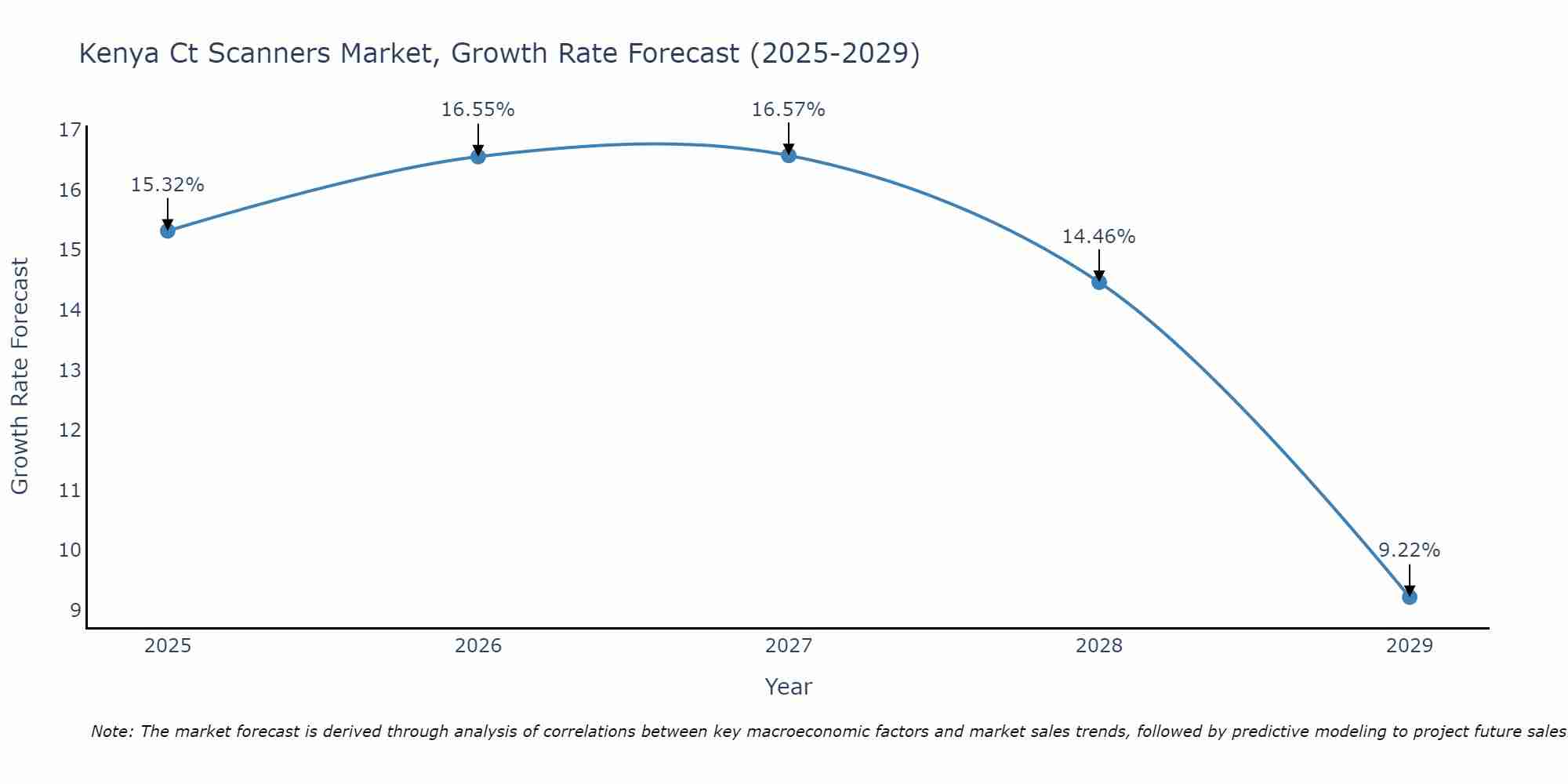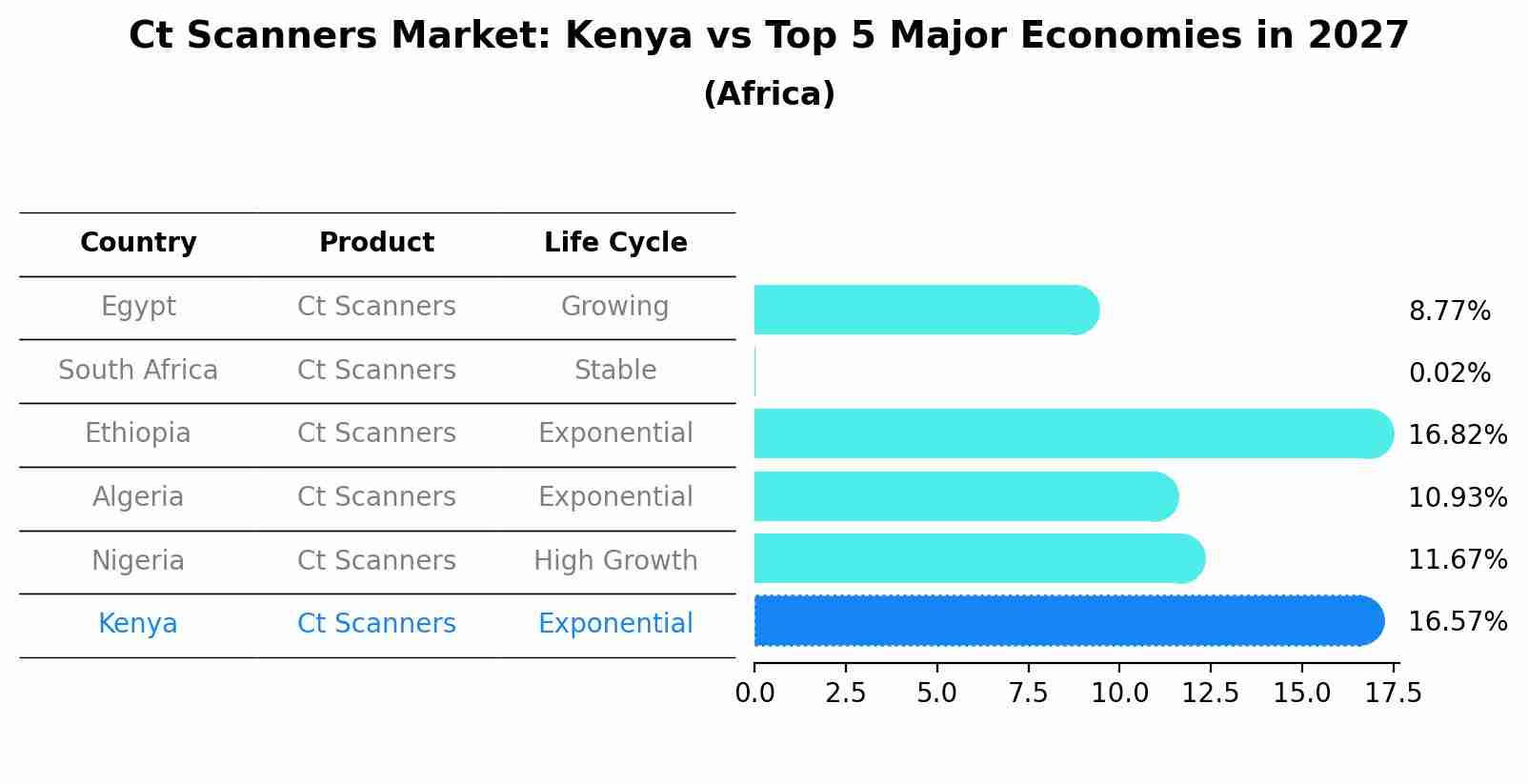Kenya Ct Scanners Market Outlook | Forecast, Analysis, Size, Companies, Revenue, Value, Trends, Growth, COVID-19 IMPACT, Industry & Share
| Product Code: ETC362810 | Publication Date: Aug 2022 | Updated Date: Aug 2025 | Product Type: Market Research Report | |
| Publisher: 6Wresearch | Author: Summon Dutta | No. of Pages: 75 | No. of Figures: 35 | No. of Tables: 20 |
Kenya Ct Scanners Market Size Growth Rate
The Kenya Ct Scanners Market is projected to witness mixed growth rate patterns during 2025 to 2029. Growth accelerates to 16.57% in 2027, following an initial rate of 15.32%, before easing to 9.22% at the end of the period.

Ct Scanners Market: Kenya vs Top 5 Major Economies in 2027 (Africa)
In the Africa region, the Ct Scanners market in Kenya is projected to expand at a exponential growth rate of 16.57% by 2027. The largest economy is Egypt, followed by South Africa, Ethiopia, Algeria and Nigeria.

Kenya Ct Scanners Market Synopsis
The Kenya CT scanners market is witnessing steady growth due to increasing healthcare infrastructure development and rising demand for advanced diagnostic technologies. The market is driven by factors such as a growing prevalence of chronic diseases, rising healthcare expenditure, and government initiatives to improve healthcare services. Private healthcare providers are investing in upgrading their imaging equipment to enhance diagnostic capabilities, further boosting market growth. Additionally, technological advancements in CT scanners, such as higher image resolution and faster scanning speeds, are driving market expansion. However, challenges such as high equipment costs and limited access to advanced healthcare facilities in rural areas may hinder market growth. Overall, the Kenya CT scanners market is poised for continued development with opportunities for market players to introduce innovative and cost-effective solutions to cater to the growing healthcare needs in the country.
Kenya Ct Scanners Market Trends
Currently, the Kenya CT scanners market is witnessing a growing demand for advanced technology such as portable and handheld CT scanners, which offer greater mobility and flexibility for healthcare providers. Additionally, there is a rising emphasis on incorporating artificial intelligence (AI) and machine learning capabilities into CT scanners to improve diagnostic accuracy and efficiency. With increasing awareness about the benefits of early disease detection and personalized medical treatments, there is a growing adoption of CT scanners in both public and private healthcare facilities in Kenya. The market is also seeing a trend towards the integration of CT scanners with other imaging modalities for a more comprehensive diagnostic approach. Overall, the Kenya CT scanners market is poised for continued growth driven by technological advancements and increasing healthcare investments.
Kenya Ct Scanners Market Challenges
In the Kenya CT scanners market, some challenges include limited healthcare infrastructure, high initial costs of CT scanners, and a shortage of skilled technicians to operate and maintain the equipment. Additionally, regulatory hurdles and import duties can increase the overall cost of CT scanners, making them less accessible to healthcare facilities in Kenya. The lack of widespread insurance coverage for CT scans further hinders market growth, as patients may be unable to afford the procedure out-of-pocket. Addressing these challenges will require investments in healthcare infrastructure, training programs for technicians, and potentially revisiting import regulations to reduce costs and improve affordability for both healthcare facilities and patients in Kenya.
Kenya Ct Scanners Market Investment Opportunities
The Kenya CT scanners market presents promising investment opportunities due to the increasing demand for advanced medical imaging technologies in the country. The growing prevalence of chronic diseases, rising healthcare infrastructure development, and the government`s focus on improving healthcare services are driving the demand for CT scanners. Investors can explore opportunities in supplying high-quality and cost-effective CT scanners to hospitals, diagnostic centers, and healthcare facilities in Kenya. Additionally, offering maintenance services, training programs, and software solutions for CT scanners can be lucrative in this market. Collaborating with local healthcare providers, establishing distribution partnerships, and staying updated on regulatory requirements will be crucial for success in tapping into the growing Kenya CT scanners market.
Jordan Agar Market Government Policies
The Kenyan government has implemented various policies related to the Ct scanners market, aimed at regulating the quality of healthcare services and ensuring patient safety. One such policy is the Kenya Health Act, which provides guidelines for the procurement and operation of medical equipment, including Ct scanners, in healthcare facilities. Additionally, the government has established the Kenya Medical Equipment Authority (KEMSA) to oversee the registration, distribution, and maintenance of medical devices, including Ct scanners, to ensure their compliance with national quality standards. These policies promote transparency in the procurement process, encourage the use of reliable and safe medical equipment, and ultimately contribute to improving healthcare services in Kenya.
Kenya Ct Scanners Market Future Outlook
The future outlook for the Kenya CT scanners market is promising, with a projected growth driven by increasing healthcare infrastructure investments, rising prevalence of chronic diseases, and advancements in technology. The demand for CT scanners is expected to expand as healthcare facilities aim to enhance diagnostic capabilities and improve patient outcomes. Additionally, the growing awareness among the population regarding early disease detection and the need for accurate diagnosis will further fuel market growth. Furthermore, government initiatives aimed at improving healthcare services and expanding access to medical imaging technologies are likely to contribute to the market`s expansion. Overall, the Kenya CT scanners market is anticipated to experience steady growth in the coming years as the country`s healthcare sector continues to evolve and modernize.
Key Highlights of the Report:
- Kenya Ct Scanners Market Outlook
- Market Size of Kenya Ct Scanners Market, 2021
- Forecast of Kenya Ct Scanners Market, 2031
- Historical Data and Forecast of Kenya Ct Scanners Revenues & Volume for the Period 2018 - 2031
- Kenya Ct Scanners Market Trend Evolution
- Kenya Ct Scanners Market Drivers and Challenges
- Kenya Ct Scanners Price Trends
- Kenya Ct Scanners Porter's Five Forces
- Kenya Ct Scanners Industry Life Cycle
- Historical Data and Forecast of Kenya Ct Scanners Market Revenues & Volume By Type for the Period 2018 - 2031
- Historical Data and Forecast of Kenya Ct Scanners Market Revenues & Volume By Stationary CT scanners for the Period 2018 - 2031
- Historical Data and Forecast of Kenya Ct Scanners Market Revenues & Volume By Portable CT scanners for the Period 2018 - 2031
- Historical Data and Forecast of Kenya Ct Scanners Market Revenues & Volume By Device Architecture for the Period 2018 - 2031
- Historical Data and Forecast of Kenya Ct Scanners Market Revenues & Volume By C-arm CT Scanners for the Period 2018 - 2031
- Historical Data and Forecast of Kenya Ct Scanners Market Revenues & Volume By O-arm CT Scanners for the Period 2018 - 2031
- Historical Data and Forecast of Kenya Ct Scanners Market Revenues & Volume By Technology for the Period 2018 - 2031
- Historical Data and Forecast of Kenya Ct Scanners Market Revenues & Volume By High-slice CT for the Period 2018 - 2031
- Historical Data and Forecast of Kenya Ct Scanners Market Revenues & Volume By Mid-slice CT for the Period 2018 - 2031
- Historical Data and Forecast of Kenya Ct Scanners Market Revenues & Volume By Low-slice CT for the Period 2018 - 2031
- Historical Data and Forecast of Kenya Ct Scanners Market Revenues & Volume By Cone-beam CT for the Period 2018 - 2031
- Historical Data and Forecast of Kenya Ct Scanners Market Revenues & Volume By Application for the Period 2018 - 2031
- Historical Data and Forecast of Kenya Ct Scanners Market Revenues & Volume By Human Application for the Period 2018 - 2031
- Historical Data and Forecast of Kenya Ct Scanners Market Revenues & Volume By Diagnostic Applications for the Period 2018 - 2031
- Historical Data and Forecast of Kenya Ct Scanners Market Revenues & Volume By Cardiology Applications for the Period 2018 - 2031
- Historical Data and Forecast of Kenya Ct Scanners Market Revenues & Volume By Oncology Applications for the Period 2018 - 2031
- Historical Data and Forecast of Kenya Ct Scanners Market Revenues & Volume By Neurology Applications for the Period 2018 - 2031
- Historical Data and Forecast of Kenya Ct Scanners Market Revenues & Volume By Intraoperative Applications for the Period 2018 - 2031
- Historical Data and Forecast of Kenya Ct Scanners Market Revenues & Volume By Veterinary Application for the Period 2018 - 2031
- Historical Data and Forecast of Kenya Ct Scanners Market Revenues & Volume By Research Application for the Period 2018 - 2031
- Kenya Ct Scanners Import Export Trade Statistics
- Market Opportunity Assessment By Type
- Market Opportunity Assessment By Device Architecture
- Market Opportunity Assessment By Technology
- Market Opportunity Assessment By Application
- Kenya Ct Scanners Top Companies Market Share
- Kenya Ct Scanners Competitive Benchmarking By Technical and Operational Parameters
- Kenya Ct Scanners Company Profiles
- Kenya Ct Scanners Key Strategic Recommendations
Frequently Asked Questions About the Market Study (FAQs):
- Single User License$ 1,995
- Department License$ 2,400
- Site License$ 3,120
- Global License$ 3,795
Search
Thought Leadership and Analyst Meet
Our Clients
Related Reports
- Germany Breakfast Food Market (2026-2032) | Industry, Share, Growth, Size, Companies, Value, Analysis, Revenue, Trends, Forecast & Outlook
- Australia Briquette Market (2025-2031) | Growth, Size, Revenue, Forecast, Analysis, Trends, Value, Share, Industry & Companies
- Vietnam System Integrator Market (2025-2031) | Size, Companies, Analysis, Industry, Value, Forecast, Growth, Trends, Revenue & Share
- ASEAN and Thailand Brain Health Supplements Market (2025-2031) | Strategy, Consumer Insights, Analysis, Investment Trends, Opportunities, Growth, Size, Share, Industry, Revenue, Segments, Value, Segmentation, Supply, Forecast, Restraints, Outlook, Competition, Drivers, Trends, Demand, Pricing Analysis, Competitive, Strategic Insights, Companies, Challenges
- ASEAN Bearings Market (2025-2031) | Strategy, Consumer Insights, Analysis, Investment Trends, Opportunities, Growth, Size, Share, Industry, Revenue, Segments, Value, Segmentation, Supply, Forecast, Restraints, Outlook, Competition, Drivers, Trends, Demand, Pricing Analysis, Competitive, Strategic Insights, Companies, Challenges
- Europe Flooring Market (2025-2031) | Outlook, Share, Industry, Trends, Forecast, Companies, Revenue, Size, Analysis, Growth & Value
- Saudi Arabia Manlift Market (2025-2031) | Outlook, Size, Growth, Trends, Companies, Industry, Revenue, Value, Share, Forecast & Analysis
- Uganda Excavator, Crane, and Wheel Loaders Market (2025-2031) | Strategy, Consumer Insights, Analysis, Investment Trends, Opportunities, Growth, Size, Share, Industry, Revenue, Segments, Value, Segmentation, Supply, Forecast, Restraints, Outlook, Competition, Drivers, Trends, Demand, Pricing Analysis, Competitive, Strategic Insights, Companies, Challenges
- Rwanda Excavator, Crane, and Wheel Loaders Market (2025-2031) | Strategy, Consumer Insights, Analysis, Investment Trends, Opportunities, Growth, Size, Share, Industry, Revenue, Segments, Value, Segmentation, Supply, Forecast, Restraints, Outlook, Competition, Drivers, Trends, Demand, Pricing Analysis, Competitive, Strategic Insights, Companies, Challenges
- Kenya Excavator, Crane, and Wheel Loaders Market (2025-2031) | Strategy, Consumer Insights, Analysis, Investment Trends, Opportunities, Growth, Size, Share, Industry, Revenue, Segments, Value, Segmentation, Supply, Forecast, Restraints, Outlook, Competition, Drivers, Trends, Demand, Pricing Analysis, Competitive, Strategic Insights, Companies, Challenges
Industry Events and Analyst Meet
Whitepaper
- Middle East & Africa Commercial Security Market Click here to view more.
- Middle East & Africa Fire Safety Systems & Equipment Market Click here to view more.
- GCC Drone Market Click here to view more.
- Middle East Lighting Fixture Market Click here to view more.
- GCC Physical & Perimeter Security Market Click here to view more.
6WResearch In News
- Doha a strategic location for EV manufacturing hub: IPA Qatar
- Demand for luxury TVs surging in the GCC, says Samsung
- Empowering Growth: The Thriving Journey of Bangladesh’s Cable Industry
- Demand for luxury TVs surging in the GCC, says Samsung
- Video call with a traditional healer? Once unthinkable, it’s now common in South Africa
- Intelligent Buildings To Smooth GCC’s Path To Net Zero


















